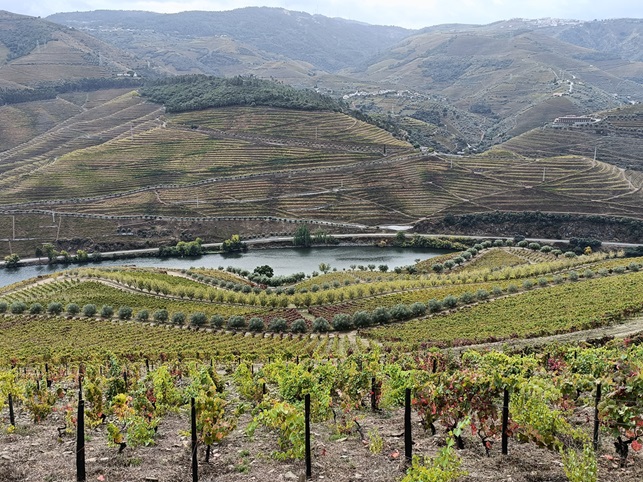
The breathtaking beauty of vineyards in the Douro Valley, in northern Portugal. Row after row of impeccably neat lines, rising from the banks of the Douro River and ending somewhere near the clouds. Rightfully, these steep terraced vineyards have earned the region UNESCO World Heritage status.
But something is different here, in this particular spot, on this particular slope, in the centre of the Douro. The vines falling away from me – on a 35- to 40-degree slope – form different patterns to those on the other side of the river. It’s because these vines were planted in vertical rows, heading south, downhill, towards the river. You’re not allowed to plant vines this way nowadays, since the region gained UNESCO protection, but this vineyard was planted in 1947 and provides fruit for one of my favourite wines from the Douro, Quinta dos Murças’ VV1947.
The wine comes from the estate’s oldest vineyard – with the name highlighting the fact it’s from a rare vertical vineyard (VV) planted in 1947 (at altitudes between 262 and 292m). The grapes, as you might expect in an old vineyard, are a mixture of varieties and include Touriga Nacional, Touriga Franca, Sousão, Tinta Amarela, Tinta Barroca, and Tinta Roriz.
The grapes are handpicked, de-stemmed, and crushed by feet in granite lagares. After the fermentation with indigenous yeasts, the skins are pressed in a vertical press and the wine is sent to neutral oak for 18 months of ageing. It sounds so traditional – but the company behind the wines is anything but traditional.
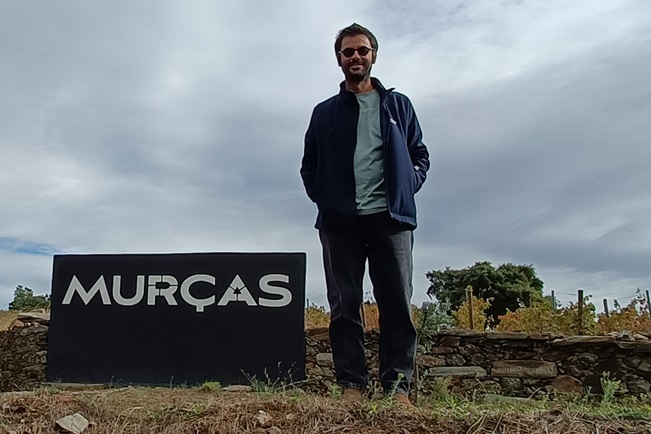
Winemaker José Luis Moreira da Silva (above) is a fan of vinha ao alto (vertical planting). He says the benefits include:
- Improved sun exposure, allowing for more even and balanced ripening of the grapes;
- Better air circulation, reducing the risk of fungal diseases;
- Soil conservation – minimising erosion on the steep slopes because of the denser planting and cover crops (such as green beans);
- Increased yields, again due to the increased density of planting.
José Luís, who joined the winery in 2015, points to some terraced vineyards across the river, estimating the traditional one with dry-stone walls carries 6,000 to 7,000 vines per hectare, decreasing to 3,000 for the cheaper-to-build patamares (banks of earth not supported by walls).
“Here you have 8,000 and, in a vineyard we planted three years ago, we have 11,000,” he says, explaining this means “more competition, less production”. Although they crop for fewer bunches per plant, the average yield per hectare is higher: increasing from the average 3 tonnes per hectare to 13 tonnes per hectare in some cases.
The Quinta dos Murcas estate was founded in 1714 and is located between the towns of Régua and Pinhão. Today, the estate comprises 155ha and is planted with olive, orange and almond trees as well as vines. It was purchased by the Esporão group in 2008.
Using a vertical vineyard when everyone else in the region uses some form of terracing is just one illustration of how the group – one of the largest organic wine producers in the world – likes to experiment, take risks, do things differently, mix innovation and tradition, and be a pioneer. It’s a strategy that has worked well for them so far.
Esporão was founded in 1977 by José Roquette and Joaquim Bandeira. The company is best known for its Herdade de Esporão estate in the Alentejo region – recently named no61 in the World’s Best Vineyard list. This century, it has expanded to produce wines in the Douro (Murcas) and Vinho Verde (Quinta do Ameal).
Together, these three estates stand out as shining examples of how innovation, sustainability, and a deep respect for tradition can coexist in the world of wine. Their pioneering practices not only produce exceptional wines but also pave the way for a more sustainable and dynamic future for Portuguese wine producers.
Examining the three estates and what sets them apart in their regions
Herdade do Esporão
Herdade do Esporão, located in the sun-drenched Alentejo region, has been at the forefront of organic viticulture in Portugal. Under the leadership of José’s son, João Roquette, who took over in 2006, the estate embarked on an ambitious 12-year journey to become certified organic. This transformation was no small feat, considering the estate’s size – more than 1,800ha, with 500ha of vineyards and 82ha of olive groves. (In total, Esporão owns 623ha of organic vineyards – representing about 18% of total organic production in Portugal.)
The decision to go organic was driven by several factors:
- Environmental stewardship – recognising the impact of conventional farming on soil health and biodiversity, Esporão sought to nurture the land for future generations;
- Wine quality – the belief that healthier soils and vines would lead to more expressive, terroir-driven wines;
- Consumer demand – responding to the growing market for organic and sustainably produced wines.
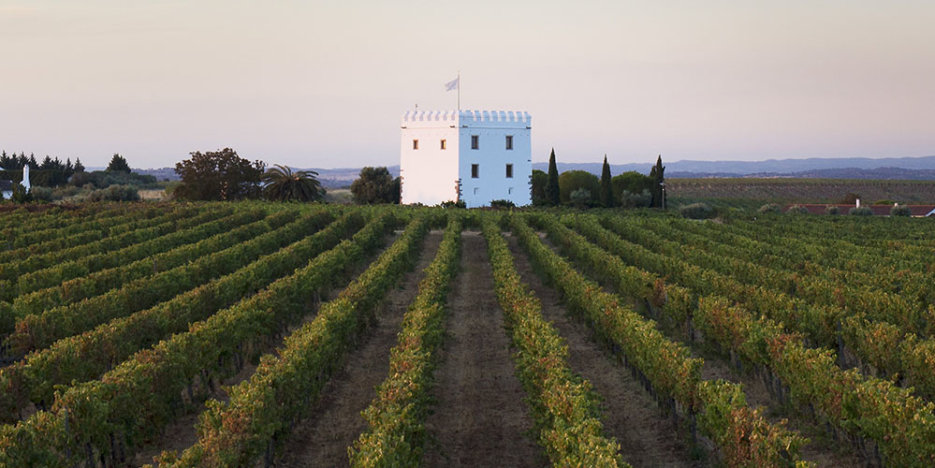
José Luís says the benefits of organic production include increased soil protection, resilience, and quality of the vineyards, as well as healthier and more balanced grapes that require less intervention in the winery. He believes organic grapes are also lower in alcohol, explaining: “When you have more things competing for the same food, especially in a place where you have really low organic material in the soil, they will lower the vigour. That’s actually happening so our vines are smaller and the production is like one or two bunches per vine.”
He says the main disadvantages of organic farming are the increased cost of additional manpower and the drop in production during the conversion period.
All their vineyards have been certified organic since 2019, but Esporão’s commitment to sustainability goes beyond organic certification. Some of their pioneering practices include:
- Water conservation – implementing drip-irrigation systems and drought-resistant grape varieties to combat the challenges of Alentejo’s hot, dry climate;
- Biodiversity promotion – creating wildlife corridors and maintaining areas of native vegetation between vineyard blocks;
- Energy efficiency – investing in solar power and energy-efficient winemaking equipment;
- Waste reduction – implementing a comprehensive recycling programme and composting organic waste for use in the vineyards;
- Mulching to increase soil fertility and the introduction and promotion of predatory species, such as bats and chickens, for pest control.
Quinta dos Murças
As well as vertical planting, Quinta dos Murças has been a pioneer in showcasing the potential of still wines from the region. They’ve done this by:
- Focusing on indigenous varieties like Touriga Nacional, Touriga Franca, and Tinta Roriz;
- Experimenting with varietal wines to express the unique characteristics of each grape;
- Utilising minimal intervention winemaking techniques to allow the terroir to shine through.
Minas is named after the five water springs that help to cool the area. It’s a blend of Touriga Franca, Touriga Nacional, Tinta Roriz, Tinta Francisca, and Tinto Cão.
In its 10ha “ampelographic field”, the company has 180-190 grape varieties planted, giving it “a reservoir of information, but also a very important genetic heritage”, according to José Luís. “It allows us to study, evaluate and try, especially now with climate change, to find many solutions to the problems we have been experiencing.”
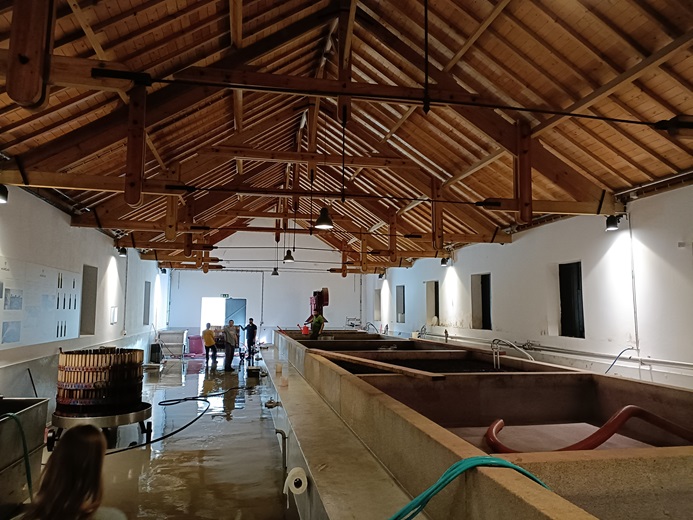
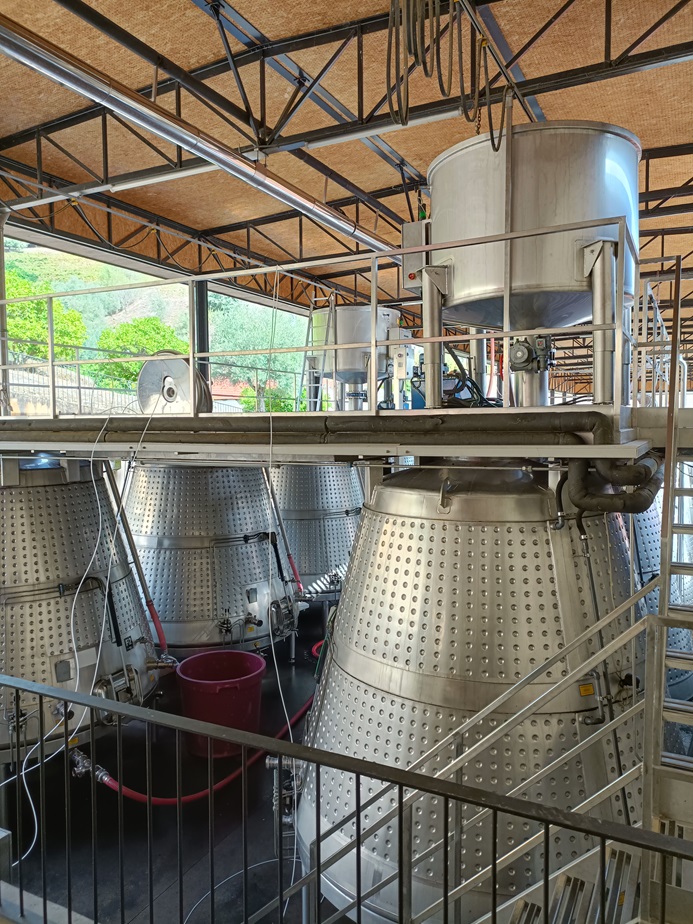
We finish our tour of the vineyards by looking at a recently-planted north-facing, high-altitude vineyard – the type that’s increasing in value in the Douro as a countermeasure to climate change.
In the winery, I come across temperature-controlled lagares and conical tanks where the extraction is limited to one or two pumpovers in the early stages of fermentation. But the biggest surprise is the use of oxidised hops as a preservative. They are added to the fermentation for an experimental wine that has 0.0 sulphites. They have been experimenting with this for four years and have got to the stage where the beer notes are negligible. They are also experimenting with a sour beer yeast which turns sugar to lactic acid, not alcohol.
Quinta do Ameal
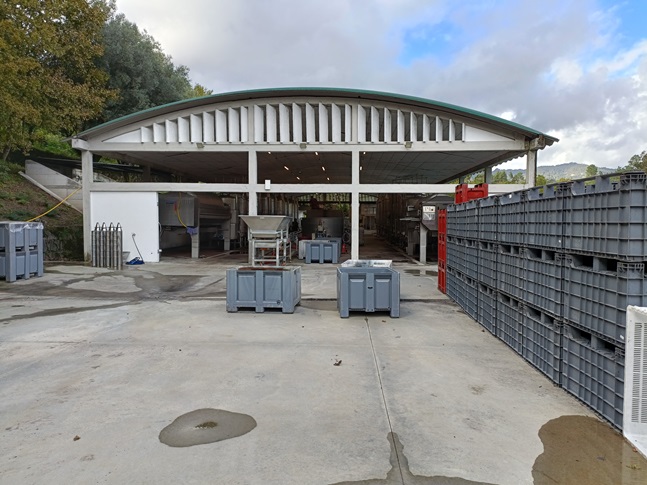
At Quinta do Ameal, in the Vinho Verde region, the groundbreaking element is the focus on the Loureiro grape – producing fresh, aged, sweet and, now, sparkling versions using concrete eggs and tanks, steel tanks and oak foudres.
Acquired by Esporão in 2019, Quinta do Ameal has long been a trailblazer in demonstrating the ageing potential and complexity of wines from this traditionally light, fresh wine region.
Quinta do Ameal’s pioneering practices include:
- Single-varietal focus – while many Vinho Verde producers blend grape varieties such as Alvarinho, Arinto, Azal, Avesso, Trajadura and Loureiro, Ameal has championed single-varietal Loureiro wines;
- Low-yield viticulture – restricting yields to produce more concentrated, complex wines;
- Extended lees ageing – employing techniques more commonly associated with white Burgundies to add depth and texture to their wines (I tasted Loureiro wines with seven, eight and 12 months on lees);
- Showcasing terroir – producing single-vineyard wines that express the unique characteristics of different plots within the estate.
José Luís, who joined Esporão to oversee the winemaking at Quinta dos Murças and added Quinta do Ameal in 2019, says his winemaking philosophy is: ”Interfere as little as possible with the process and uncover the real identity of each vineyard, grape variety and origin.”
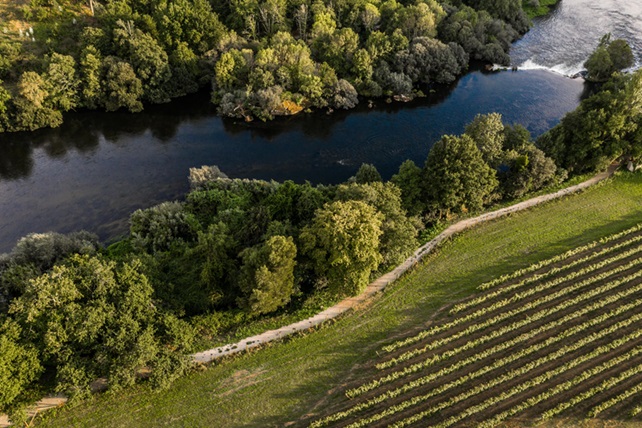
Like its sister estates, Quinta do Ameal is committed to sustainable practices. These include:
- Organic viticulture – the 30ha estate, including 15ha of vineyards, is farmed organically;
- Biodiversity conservation – maintaining 8ha of forest, including 200-year-old trees, to promote a healthy ecosystem.
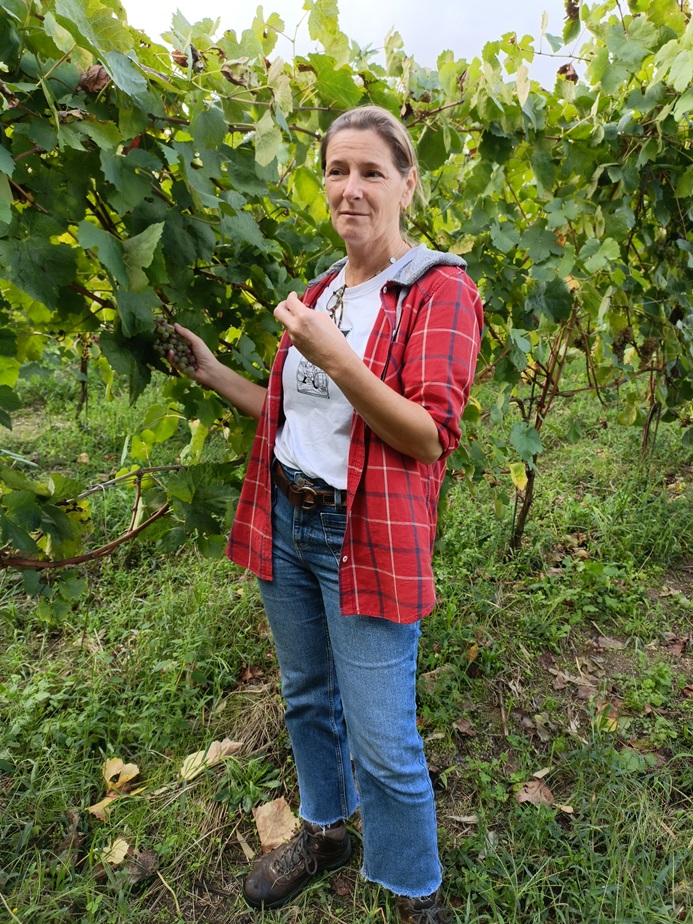
Making a variety of wines with one grape variety is a challenge Quinta do Ameal’s winemaker, Mafalda Magalhães (above), enjoys. As we toured the vineyard and winery, she commented: “The energy of this place is inspiring. But we need to explore more.”
Pushing the boundaries seems to be part of the group’s DNA, but why?
Why adopt these pioneering practices?
The adoption of these pioneering practices across all three estates stems from a shared philosophy within the Esporão group:- Quality-focused – by prioritising the health of the vineyards and minimal intervention in the winery, they aim to produce wines of the highest quality that truly reflect their terroir;
- Sustainability – they recognise that the wine industry must adapt to face climate change and ensure the longevity of their estates;
- Differentiation – in a competitive global wine market, these unique approaches help their wines stand out and tell a compelling story to consumers;
- Preservation of heritage – while innovating, there’s also a strong emphasis on preserving and showcasing Portugal’s rich viticultural heritage, particularly through the focus on indigenous grape varieties;
- Consumer education – by producing wines that challenge preconceptions (like age-worthy Vinho Verde or complex Douro reds), they’re helping to educate consumers about the diversity and quality of Portuguese wines.
Chris Boiling travelled to Portugal with Esporão's UK distributor, Hatch Mansfield.

 English
English French
French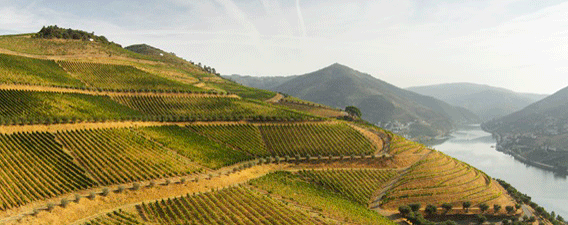







.png)


